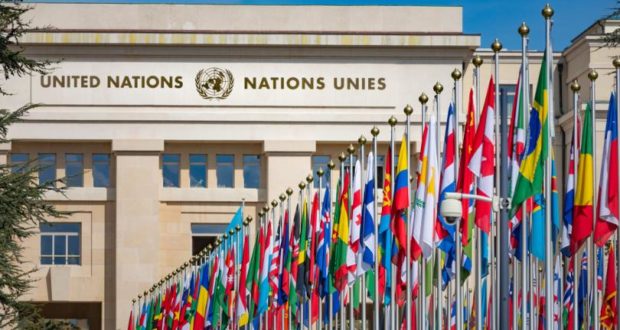يردد البيان ادعاء مكتب مفوض الأمم المتحدة السامي لحقوق الإنسان بأن القيود المفروضة على الإجهاض “تشكل انتهاكات لحقوق الإنسان”.
وفقًا لهيئة حقوق الإنسان التابعة للأمم المتحدة ، فإن تعزيز هندوراس مؤخرًا لحظر الإجهاض يتحدى “الالتزامات الدولية” ، واستبعاد الأزواج من نفس الجنس من الزواج المدني يتعارض مع مبادئ “المساواة” و “عدم التمييز”!!
“تأسف #OACNUDH للإصلاح الدستوري للحظر المطلق للإجهاض ويذكر بأنه يتعارض مع الالتزامات الدولية والتوصيات المحددة لدولة هندوراس بشأن حقوق المرأة” ، غرد مكتب هندوراس لمفوضية الأمم المتحدة السامية لحقوق الإنسان (OACNUDH) هندوراس).
في حين أن جميع عمليات الإجهاض ، بما في ذلك حالات الاغتصاب أو سفاح القربى ، كانت غير قانونية في هندوراس منذ عام 1982، إلا أن التعديل الدستوري المعروف باسم “الدرع ضد الإجهاض في هندوراس” الذي تم إقراره الأسبوع الماضي عزز حظر الإجهاض في هندوراس ، والذي يتطلب ثلاثة أرباع الأغلبية لإلغاء الحماية القانونية لأرواح الأجنة.
إن إدانة OACNUDH هندوراس للتعديل المؤيد للحياة تعكس الموقف المشترك والقوي المؤيد للإجهاض لهيئات الأمم المتحدة. بشكل عام ، أرسلت هيئات الأمم المتحدة رسائل متضاربة فيما يتعلق بمسألة “الحق” الدولي في الإجهاض ، مما دفع القائم بأعمال المدير السابق للوكالة الأمريكية للتنمية الدولية ، جون بارسا ، للإعلان للأمين العام للأمم المتحدة أنطونيو جوتيريس ، أمر مخيب للآمال أن الأمم المتحدة لا تزال تناقض نفسها علنا بشأن هذه المسألة “.
بعد أن كتب بارسا إلى جوتيريس يطلب من الأمم المتحدة “التخلي عن توفير الإجهاض كعنصر أساسي” في استجابة الأمم المتحدة لـ COVID-19 ، كتب غوتيريش مرة أخرى في 1 يونيو وأكد لبارسا أن الأمم المتحدة “لا تشجع ، ناهيك عن فرض ، الإجهاض على أي شخص “، وأنه” وفقًا لميثاقها ، لا تتدخل الأمم المتحدة في الأمور التي تقع أساسًا ضمن الولاية القضائية المحلية لأي دولة “...
..اشتكت OACNUDH Honduras من أن الإصلاح القانوني يمنع بشكل أساسي الأزواج من نفس الجنس من الزواج المدني ، وكتب على تويتر ، “يعبر #OACNUDH عن قلقه بشأن الإصلاح الدستوري فيما يتعلق بحظر الزواج المتساوي الذي يتعارض مع مبدأ المساواة وعدم التمييز.”
يجادل البعض بأن الزواج من نفس الجنس ، مثل الإجهاض ، هو “حق” دولي. وصف كريستيان غونزاليس كابريرا ، الباحث في مجال حقوق المثليين في هيومن رايتس ووتش ، تعديل هندوراس الأصلي لعام 2005 الذي يحظر زواج المثليين بأنه “انتهاك للقانون الدولي” ، لأن محكمة البلدان الأمريكية لحقوق الإنسان أصدرت حكمًا في عام 2017 دعا إلى تمديد جميع حقوق الأزواج من جنسين مختلفين للأزواج من نفس الجنس أيضًا.
ومع ذلك ، لا تدعو الأمم المتحدة حاليًا إلى “حق” دولي في “زواج المثليين”. أوضح المحامي مارك فاولر ، “إن ادعاء” المساواة في الزواج “لا تؤكده قرارات أعلى سلطات حقوق الإنسان في النظام الدولي. قررت كل من لجنة الأمم المتحدة لحقوق الإنسان والمحكمة الأوروبية لحقوق الإنسان أنه لا يوجد عدم مساواة حيث تحتفظ الدولة بالتعريف التقليدي للزواج “.
UN body says Honduras abortion ban defies ‘international obligations’
By Emily Mangiaracina The statement echoes a claim by the Office of the UN High Commissioner of Human Rights that abortion restrictions ‘constitute human rights violations.’
According to a United Nations Human Rights body, Honduras’ recent strengthening of their abortion ban defies “international obligations,” and its exclusion of same-sex couples from civil marriage is contrary to the principles of “equality” and “non-discrimination.”
“#OACNUDH regrets the constitutional reform for the absolute prohibition of abortion and recalls that it contravenes international obligations and specific recommendations to the State of Honduras on the rights of women,” tweeted the Honduras Office of the United Nations High Commissioner for Human Rights (OACNUDH Honduras).
While all abortions, including in a case of rape or incest, have been illegal in Honduras since 1982, a constitutional amendment known as the “Shield Against Abortion in Honduras” that was passed last week further cemented Honduras’s abortion ban, requiring a three-quarter majority to overturn its legal protection of the lives of the unborn.
OACNUDH Honduras’ condemnation of the pro-life amendment echoes the common and strong pro-abortion stance of U.N. bodies. As a whole, however, U.N. bodies have sent mixed messages regarding the question of an international “right” to abortion, prompting former Acting Administrator of the U.S. Agency for International Development, John Barsa, to declare to U.N. Secretary General Antonio Guterres, “It is disappointing that the UN continues to contradict itself publicly on this issue.”
After Barsa wrote to Guterres asking that the U.N. “drop the provision of abortion as an essential component” of the U.N.’s COVID-19 response, Guterres wrote back on June 1 assuring Barsa that the U.N. “does not promote, much less impose, abortion on anyone,” and that “in accordance with its Charter, the United Nations does not intervene in matters which are essentially within the domestic jurisdiction of any State.”
However, only days before Guterres’ letter, on May 22, the Office of the U.N. High Commissioner of Human Rights wrote a letter directed to former Secretary of State Mike Pompeo rebuking various states in the U.S. for their “concerning” attempts “to restrict women’s sexual and reproductive rights.”
The letter claimed that abortion access restrictions imposed during the COVID-19 outbreak by various states were “contrary to international human rights standards and to the obligations undertaken by the United States, including through its ratification of the International Covenant on Civil and Political Rights (ICCPR).”
The letter listed every state that had limited abortion access during COVID-19, saying, “We would like to remind U.S. authorities, that abortion care constitutes essential health care and must remain so and available during the COVID-19 crisis.”
It continued with strong language, saying that “restrictions” on “reproductive health” services like abortion and contraception “constitute human rights violations and can cause irreversible harms.”
The letter continued, “We urge officials in the United States to ensure uninterrupted and timely access to the full range of abortion procedures during this public health emergency and after, including by removing all medically unnecessary restrictions.”
Barsa lamented to Guterres in a follow-up letter that this “correspondence from the U.N. mandate-holders” was an “affront to national sovereignty.”
He continued, “The message of the letter is loud and clear: The mandate-holders believe there is an international “right to abortion” and that sexual and reproductive health is a vehicle for this “right.”
Barsa also said, “The fundamental problem at hand is that, despite claims to the contrary, including yours, the term ‘sexual and reproductive health’ and its derivatives have become shorthand for abortion within the UN.”
In addition to abortion, Honduras has also practically enshrined its traditional definition of marriage as between a man and a woman, by requiring a three-quarter majority to amend its constitution.
OACNUDH Honduras complained that the legal reform essentially bars same-sex couples from being civilly married, tweeting, “#OACNUDH expresses concern about the constitutional reform in relation to the prohibition of equal marriage that is contrary to the principle of equality and nondiscrimination.”
Some argue that same-sex marriage, like abortion, is an international “right.” Cristian González Cabrera, an LGBT rights researcher at Human Rights Watch, called Honduras’s original 2005 amendment prohibiting same-sex marriage a “violation of international law,” because the Inter-American Court of Human Rights issued a 2017 ruling that called for an extension of all the rights of heterosexual couples to same-sex couples as well.
However, the United Nations does not currently call for an international “right” to “same-sex marriage.” Lawyer Mark Fowler explained, “The ‘marriage equality’ claim is not borne out by the decisions of the highest human rights authorities in the international order. Both the United Nations Human Rights Committee and the European Court of Human Rights have held that there is no inequality where a state retains the traditional definition of marriage.”
 Agoraleaks Agoraleaks
Agoraleaks Agoraleaks







